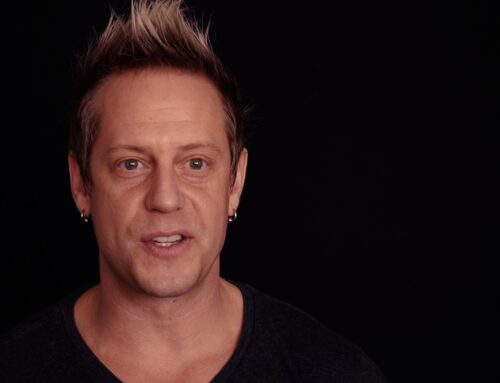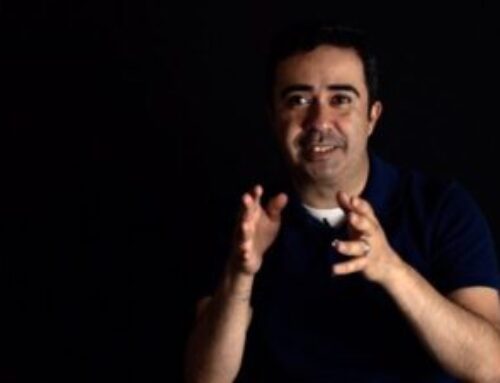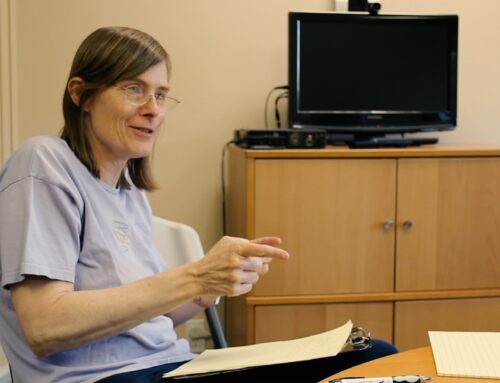LUIS ESPINOZA
One of the big blessings in making WHEN I STUTTER was developing a relationship with The National Stuttering Association (NSA). In particular, the San Marino Chapter (now South Pasadena) allowed me to be a part of their group. In fact, many of the participants in the film came from this group. Among them was Luis Espinoza… a young man, spirited and full of life!
The filming process was always interesting with Luis. He is a dynamic person and is gifted at being able to surprise and shock you- he gets a kick out of it! In truth, he is FUNNY as hell! We had lots of laughs when we were out on the town filming… In addition to being fun-loving, he also has a great depth of soul. I appreciated his willingness to reveal the, sometimes, dark feelings he had toward stuttering and people’s reactions to it.
To this day, Luis is very much like a little brother to me and it has been such a pleasure to see him grow over the years. As you will read, he is a very thoughtful young man and is still full of surprises. Among them, you’ll find out he had a hidden role in WHEN I STUTTER…
“I have accepted my stuttering and, as a consequence, my confidence towards life has risen beyond my expectations.”
(1) What has been the response from others about you in the film?
Friends, colleagues, classmates, and speech therapists who have watched the film have stated how brave I was for sharing my thoughts and feelings about stuttering. To this day, when an audience member comments about how informative my role in the film is, I don’t always truly feel that what I had to say really mattered. Yet, looking at the film with my current perspective (I’m a student speech-language pathologist), I can see how enlightening my comments are about the inner life of a person who stutters. To a large degree, stuttering is unknown to the average person. However, informing society about what stuttering is and how it can emotionally impact a person (whether those are negative or positive expressions), is important on many levels. Through this film, the average person can learn how to interact with a person who stutters and learn a little about what goes on in that person’s mind when they are in a moment of stuttering. With regard to informing the average audience member, I am glad I could share a couple of factors about how stuttering affects my day to day life.
(2) What was your favorite or most memorable part of the process of making the film?
Back in the spring of 2012, I remember John Gomez announcing that he was in the process of shooting a documentary about stuttering. I wasn’t sure where John was going to take his documentary, but I was open to seeing where he wanted to go. To be honest, all the scenes that I shot with John were memorable. However, if I had to choose one part or scene that made me change my mind, not just about John, the documentary, or stuttering, but myself as a person who stutters, then it would be our first scene together. To summarize, John invited me to his home with warm regard and began talking to me as an average person, not focusing on my stuttering. Sure, I was there to help John film a couple of scenes about my perception toward stuttering, but within the first few moments, we shared a standard conversation as gentlemen and basically talked about life. Some people might think “so what” about themselves, but what made me change my mind about John was how patient, compassionate, and humane he was with me. John approached me as a person and not as “Luis the guy who stutters”. With that said, we moved forward to shoot my scenes in his living room, and he just basically asked me questions about myself overall. Meaning, he wanted to get to know me as a person first, so we talked about: hobbies, interests, goals, occupation, and family. And right away, I felt comfortable with him because once again, we were just talking as gentlemen, which went on for a few moments. Nevertheless, we did touch upon stuttering and how I saw stuttering at that time. Yes, my feelings towards stuttering were extremely negative at the time as I saw no hope toward my future. When John told me to elaborate more as a person who stutters, yes I did, in fact, express how I felt at the time such as I was not comfortable being a person who stutters and that I was basically losing faith in my speaking ability. What I noticed at the same time was how patient and how well John listened to what I had to say rather than how I was producing my speech. I will admit, during the spring of 2012, I considered myself a severe stutterer. John was there patiently waiting for my words to come out and he gave me a facial expression that let me know that what I had to say mattered more than my fluency. Our interview went on close to an hour (which went by fast in my opinion) but for this reason, this was the most memorable scene… being treated as a person rather than a person with a disorder.
(3) What has surprised you about the film since it was first presented?
To this day, I can’t believe how widespread the impact of the film has been. The fact that my thoughts towards stuttering have been, and still are, being shared with strangers across the world is unbelievable. Even at this moment, I still cannot comprehend the overall recognition the film has received. I am not surprised about how well the film has been received by SLPs, people who stutter, and friends/family members who stutter. However, I don’t think I realized how emotionally impactful the film would be for the average audience member who does not stutter. Of course, as a person who stutters, I am very aware that stuttering is emotionally hard at times. However, watching an audience member (who does not stutter) breakdown when they witness the hardships of stuttering for the first time, still gets me.
(4) What’s changed in your life since we saw you in the film?
From the age of 22 to the age of 30, some things have changed- depending on how one looks at it. At the age of 22, I did not accept my stuttering, I had no purpose in life but to get by, and basically to just exist and not live life to its fullest. However, during 2012, I began attending fluency workshops, conferences, local support groups for people who stutter, and I also gave speech therapy another shot. Within that one year of being exposed to the world of stuttering and other types of fluency disorders, I noticed that many individuals who stutter were successful AND they were no different than me! I noticed that these people stuttered and they loved their occupations. The majority of these individuals graduated from highly respected universities. Some of these people were teachers, engineers, managers, athletes, lawyers, researchers, artists, musicians, and some were even speech therapists. I was blown away to know that these people who stuttered could live a successful life without their stuttering holding them back. Within those moments, I asked myself “what was my excuse for not grabbing life by the horns and taking my life toward my preferred direction?”
Although my mindset had shifted, I did not know what I wanted to do with my life until I concluded my speech therapy sessions the following year with Gail Wilson Lew. At that time, I noticed that her occupation was to help clients communicate to get what they needed from life. For some reason, my mind clicked, and I broke the news to Gail that I wanted to become a speech therapist just like her. Why? If she can help me communicate toward my preferred goals and give me the confidence to take my life by the horns and make my own destiny a reality, then why can I not do the same thing for my future clients? With that said, I will graduate in May 2020 with a bachelor’s degree in communication sciences and disorders from Cal State University Fullerton. Moreover, my love for education has been elevated ever since I decided to go back to school. Yes, my main focus was to go back to school to major in speech-language pathology, but I also wanted to learn how to be a better person, a better contributor to society, and be able to learn from my mistakes. For anyone that has known me, this is a big leap in my personal development. My love for science, politics, philosophy, conspiracy theories, mathematics, history, and logic have all risen for the better. I practice open-mindedness, I analyze everything and I’ve learned to admit that I don’t know everything about the world. Some might say that I have matured and I have… but, when it comes to joking around, I still have the mindset of a 16-year-old- I guess some things never change.
(5) What’s your relationship with stuttering now?
To put it simply, my thoughts, feelings, perceptions, and my relationship with stuttering went from negative to positive. Growing up as a person who stutters, it is no surprise that I hated how I sounded and I refused to speak unless I had to. I demonstrated a lot of core behaviors and developed many secondary behaviors, all of which I had no idea that I was expressing until it was brought to my attention in speech therapy. I want to say around Jr. high, I began to despise speech therapy. Why? I hated being pulled out of class while my classmates watched me leave. For most speech sessions, I had no idea why I was in that room. My therapist would ask me how my week went, discuss current news, talk about stuttering, and maybe apply a technique here and there. All of these things were a waste of time in my opinion. Those therapy sessions in school left me with a negative impression of speech therapists that I carried into my early 20s. To this day, there is still a small percentage of me that has a negative attitude towards speech therapists. These negative memories have made me rethink how I will conduct therapy with my future clients.
When I went back to speech therapy with Gail in my early 20s, I changed my mind about the field in a major way. I saw life-changing, positive results in that year and a half. Those good therapy experiences, along with attending workshops, conferences, and local support groups really helped me grow. It took years, but eventually, I started to accept my stuttering and realize that my listener does not care if I stutter. Most people have their own circumstances that they have to go through and they are not focusing on another person’s stuttering. As I began to accept my stuttering as well as applying techniques during my earlier to mid-twenties, that was when my mind shifted to a more optimistic point of view. I’ve heard and witnessed throughout my educational journey that other people go through struggles and figure out ways to cope with their dilemmas- this got me thinking. If these individuals could move forward with their challenges and accept what life has to offer them, then I too could succeed in life. I have accepted my stuttering and, as a consequence, my confidence towards life has risen beyond my expectations.
(6) What’s some advice for people who are on their journey with stuttering?
There is no right answer since people who stutter come in all shapes and sizes, but for the moment what I can disclose is that we all have our own journey as people who stutter. I would understand if a person who stutters tells me that they would wish for fluency, which is appropriate to express; yet, the chances of stuttering going away with a wish is highly unlikely. However, I would recommend for the person who stutters to express how they feel to close friends and family members as much as possible. People who stutter to an extent do not say what they wish to say because the fear of stuttering has gotten the best of them. It is understandable to feel hatred, annoyance, hopelessness, guilt, or apathy towards one’s stuttering. However, if a person who stutters expresses their emotions to people that they trust and listen to other people who have been down the same road, then that is the right step in the right direction. Furthermore, I would recommend learning to be comfortable with who they are as a person. Not simply comfort in being a person who stutters, but comfort with being human, being comfortable performing one’s occupations, hobbies, and being at peace with stuttering from an early age. Speech therapy is not the be-all, end-all in a person’s journey with stuttering. If that person does not feel comfortable going to speech therapy during a specific stage in life, then that’s fine. There does not need to be a race to get to speech therapy or to even go to speech therapy at all. Just being comfortable within one’s own skin is the first step.
(7) You were an actor in WHEN I STUTTER?
When John Gomez asked me if I was interested in playing the part a young Richard Alvarado(for a reenactment), I wasn’t sure what to expect. I was given an attire to represent young Richard from the 1970s, which again, I wasn’t sure if this was going to work since I didn’t think I looked anything like Richard nor did I know much about his personal story at the time. John told me not to worry about the details of portraying young Richard, but just to follow along with the script, which I did. We went to downtown Los Angeles and shot a few scenes in a 1970s bar. And to my surprise, the scenes went well! Nothing major was demanded of me, but I was instructed to just walk towards the bar, talk to two females, and walk away from the bar. I just want to emphasize that I am not an actor nor do I have experience with being an actor; however, I did, in fact, had a blast acting within that short time frame. It made me think that maybe I should act as on the side, but I was not and am currently not engaged in acting for amusement at the present time. But who knows, if I have time once my education is concluded, then perhaps I will assist John and give his film some character (;
Purchase WHEN I STUTTER to watch
Luis and 18 other compelling individuals
talk about their journey with stuttering.









